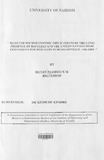| dc.description.abstract | The long presence of refugees and the United Nations High Commission for Refugees (UNHCR) in Moyo for more than twenty years has by all means impacted significantly on the socio-economic fabric of both the refugees and the Moyo society as a refugee hosting area. The implications rangmg from demographic, social servrces delivery, production, political, cultural and regional security to a large extent reflect a very dependent population with a mentality of a refugee syndrome, that over a period has generated questions about the relevancy of the currerit international refugee law. The initial philosophy of international protection for refugees being a temporary-emergency arrangement is not the case in Moyo. Refugee hood and operations of the UNHCR have assumed permanency.
Theoretical discourses are rife about the whole notion of the presence of refugees and UNHCR in different parts of the world. The solidarist approaches have been advanced as the philosophical justifications for refugees protection and the extremist strand of this school of thought posits that the refugee concept should be widened to cover anybody physically displaced, whether with in or outside the borders of the country of origin.
The realists, who see loopholes in the current law, equally call for more flexibility in allowing refugees right of asylum. However, beyond the two schools of thought, this study argues that flexibility in offering refugee status may be creating a dependency culture and a vicious cycle of Refugeehood. There is need to rethink the whole concept of refugee hood especially in Africa, in light of the apparent discrepancies in form of profiteering relief agencies (lords of poverty); perpetual refugee life that is creating a refugee economy without a state and the refugee syndrome that has become a way of life threatening any attempts of voluntary repatriation when time is ripe for refugees to go back to countries of origin.
One of the radical recommendations being made in this study is for the international community to reconceive the international refugee laws, with the view of redefining the roles and mandate of the UNHCR, from that of direct protection in the refugee hosting countries, to a coordinating role of international assistance and allowing the host states to take care of the protection and delivery of refugee related programmes. This way, it is argued, the endless phenomenon of refugee hood in Africa may be reversed. | en_US |

